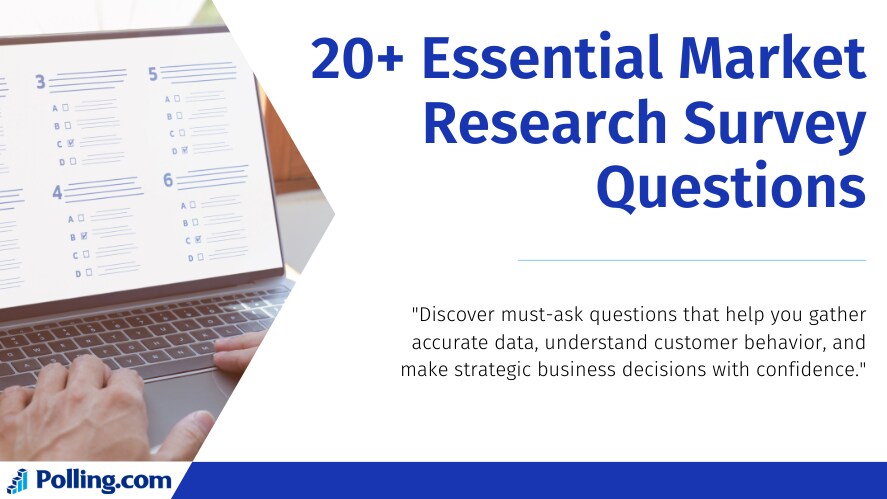
Market Research Survey Questions That Drive Business Growth
What if the key to unlocking business growth was simply asking better questions? Understanding your customers’ needs, desires, and behaviors begins with asking the right market research survey questions. In fact, these questions serve as the foundation for data-driven decisions. As a result, businesses can fine-tune their strategies, improve offerings, and stay competitive in fast-changing markets.
Moreover, using carefully crafted survey questions allows companies to gain clear insights into product performance, customer satisfaction, brand perception, and buying behaviors. Fortunately, platforms like Polling.com make it incredibly easy to create, distribute, and analyze effective market research surveys. With customizable templates, real-time reporting, and powerful analytics, tools like these help companies get closer to their audience and their goals.
In this guide, we’ll explore how market research survey questions fuel business growth, what makes a good question, essential types of questions to ask, and the best tools and practices to gather high-quality insights.
Why Market Research Matters for Your Business

The Power of Market Research Survey Questions in Decision-Making
To begin with, asking targeted market research survey questions gives businesses the clarity to make smarter, faster choices. Whether you’re launching a new product, enhancing a service, or entering a new market, strong research data guides the way.
The Benefits of Conducting Market Research
There are several key advantages to conducting a market research survey:
- It reduces business risk by validating ideas before investing heavily.
- It improves customer satisfaction by capturing honest feedback.
- It supports better product development tailored to real needs.
- It refines marketing efforts through deep audience insights.
- It builds competitive advantage by identifying trends early.
In addition, the numbers back up the value of surveys. For instance, companies that prioritize data-driven decision-making are 23 times more likely to acquire customers, according to McKinsey.
Example: How One Brand Used Surveys to Boost ROI
Let’s look at a practical example. A SaaS startup conducted a customer research survey to understand why trial users weren’t converting. Through just a few strategic market research survey questions, they discovered a key usability issue in onboarding. After resolving it, their conversion rate jumped by 20%. Clearly, even small insights can have a massive impact.
What Makes a Good Market Research Survey Question?

Not all market research survey questions are created equal. In fact, some can do more harm than good especially if they’re confusing, biased, or irrelevant.
Principles of Good Survey Questions
When crafting your questions, keep these principles in mind:
- Clarity – Avoid technical jargon or vague language.
- Relevance – Ensure each question supports your research goal.
- Objectivity – Prevent bias by using neutral phrasing.
- Brevity – Keep it short and straightforward.
Above all, your questions should be easy to understand and answer.
Open-Ended vs. Closed-Ended Questions
It’s important to use a mix of open- and closed-ended questions.
| Type | Description | Example |
|---|---|---|
| Open-ended | Allows free-form responses | “What feature would you most like to see?” |
| Closed-ended | Offers limited answer choices | “How likely are you to recommend our service? (1–5)” |
While open-ended questions uncover rich qualitative insights, closed-ended ones make it easier to quantify trends.
Common Mistakes to Avoid
Here are some pitfalls that can undermine your market nresearch survey questions:
- Asking double-barreled questions like “How do you feel about our pricing and service?”
- Using ambiguous language such as “regularly” or “often”
- Including too many choices in multiple-choice questions
- Neglecting to test your survey before launch
Avoiding these mistakes ensures your survey market research (yes, even typo-ridden phrases like that) actually delivers useful results.
Types of Market Research Survey Questions

Understanding the types of market research survey options available allows you to structure your survey more effectively. Different goals require different types of questions, which is why categorizing them makes a big difference.
Customer Demographics Questions
First, let’s start with basics. Demographic questions help you segment your audience and personalize marketing efforts.
Examples:
- What is your age group? (18–24, 25–34, etc.)
- What is your gender identity?
- Where do you live?
- What is your household income?
- What is your job role or industry?
Clearly, demographic data lays the groundwork for meaningful segmentation strategies. Moreover, it helps identify trends across customer groups.
Product or Service Feedback Questions
Secondly, gathering product or service feedback helps you improve based on real-world experiences.
Examples:
- How would you rate your overall experience with our product or service?
- Which feature do you use most often?
- What feature do you think is missing?
- Would you feel comfortable suggesting our product to friends or colleagues?
This category is essential for conducting customer surveys that enhance product quality and usability.
Brand Perception Questions
Next, it’s important to understand how people perceive your brand. After all, brand perception often influences purchase decisions.
Examples:
- Which words or thoughts do you associate with our brand?
- How do you feel about our company values?
- How would you rate our brand compared to competitors?
Gathering this data helps shape your messaging, visuals, and overall brand strategy.
Competitor Comparison Questions
In addition, knowing how your brand stacks up against others provides valuable competitive insight.
Examples:
- Were there any other companies or products you explored before selecting us?
- What made you pick us instead?
- What do you think a competitor does better?
These questions are commonly used in business survey questions for market research to benchmark your performance.
Buying Behavior Questions
Lastly, understanding buying behavior helps map the customer journey and improve targeting.
Examples:
- When did you last purchase a product like ours?
- What influenced your decision?
- Do you prefer to buy online or in-store?
- What factors matter most in your decision (price, quality, brand reputation)?
Altogether, these insights are vital for optimizing sales funnels and increasing business growth.
20+ Essential Market Research Survey Questions

To make your surveys actionable, here’s a categorized list of powerful market research survey questions:
New Product Development
- What challenges are you currently facing in [area]?
- Would you find value in a product that solves [problem]?
- What features would be essential to you?
- What price point seems reasonable for this product?
- How do you currently solve this problem?
Customer Satisfaction
- How satisfied are you with your experience?
- What aspect did you enjoy most?
- Where can we improve?
- How likely are you to recommend us to others? (NPS)
- Have you contacted support? If so, how was the experience?
Brand Perception
- What three words describe our brand?
- How would you describe our brand in relation to similar brands in the market?
- What makes us different?
- Do you feel aligned with our brand values?
Market Trends
- What industry trends are affecting your business?
- How has your behavior changed over the past year?
- What new products or services are you interested in?
Competitor Insights
- Which competitors did you consider?
- What swayed your decision in our favor?
- What could cause you to switch to a competitor?
Bonus Catch-All
- Is there anything else you’d like to share?
Pro Tip: Customize these questions based on industry, audience, or product maturity. Additionally, rotate questions regularly to avoid survey fatigue.
Tools to Create and Distribute Market Research Surveys
Why Choose Polling.com?
Among all the tools available, Polling.com stands out for its simplicity and power. Not only does it make survey creation intuitive, but it also helps businesses turn data into action.
Key Features:
- Professionally designed templates tailored to types of market research survey
- Real-time analytics dashboards
- AI-based insights for better decision-making
- Seamless collaboration with internal teams
- Mobile-optimized design for high response rates
In other words, it’s built for business users who want results not just data.
Other Popular Survey Platforms
While Polling.com is our top recommendation, other options include:
- SurveyMonkey – Versatile, with many integrations
- Google Forms – Free and easy, but lacks analytics depth
- Typeform – User-friendly with conversational UI
- Qualtrics – Enterprise-level features with premium pricing
Nonetheless, few tools offer the same balance of functionality and ease of use as Polling.com, especially for those focused on customer research survey efficiency.
Best Practices for Market Research Survey Success
To ensure that your market research survey examples (and actual surveys!) yield meaningful insights, follow these best practices:
✅ Keep Surveys Short and Focused
Ideally, limit them to 5–10 minutes. Longer surveys can cause drop-offs and reduce response quality.
✅ Mix Question Types
Use a combination of rating scales, multiple choice, and open-ended questions. As a result, you’ll get both measurable data and customer voice insights.
✅ Test Before You Launch
Always pre-test surveys with a small group. Doing so helps catch unclear wording, broken links, or logic issues.
✅ Analyze Data Promptly
Don’t just collect data interpret it. Platforms like Polling.com help turn responses into actionable dashboards within minutes.
✅ Act on What You Learn
Finally, be sure to take action on what the survey reveals. Customers appreciate knowing their voice leads to real change, which boosts loyalty.
Conclusion: Better Questions Lead to Business Growth
To sum up, asking the right market research survey questions is one of the most powerful strategies for driving sustainable business growth. When you truly understand your customers who they are, what they want, and why they buy you can adapt faster and outperform the competition.
Thanks to tools like Polling.com, running impactful customer surveys is now easier, faster, and more insightful than ever.
Ready to get started? Try Polling.com for free today. Explore professionally designed templates, real-time insights, and features designed to grow your business one great question at a time.
